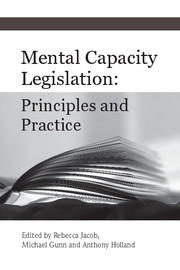Foreword
Published online by Cambridge University Press: 01 January 2018
Summary
The contrast between the underlying assumptions of the Mental Capacity Act 2005 (MCA) and the Mental Health Act 1983 (and amended in 2007) (MHA) is stark. The MCA aims to support the patient's autonomy and permits non-consensual treatment only when the person's decision-making capacity is impaired and the intervention is in the person's ‘best interests’. Even then, the person must be supported as far as possible to participate in the treatment decision. ‘Best interests’, although variously defined, emphasise the patient's perspective, asking, for instance, what the patient's decision would have been in their current predicament if their capacity had been retained. Preferences, wishes or values previously expressed by the patient should be explored, including consultation with those who know the patient well and who might be able to cast light on the question. To date, psychiatrists have not been accustomed to this type of thinking.
The MHA, on the other hand, permits involuntary treatment for those with a ‘mental disorder’ on the basis that the person has such a disorder, and that treatment is warranted in the interests of the person's health or safety, or for the protection of others: nothing about the person's decisionmaking capability, nor any requirement for the patient's perspective to be given weight in the judgement of their interests.
This conceptual disparity can easily lead to confusion in psychiatric practice. the mca applies to all patients, those with a ‘mental disorder’ as well as those with a ‘physical disorder’, but if the mha is invoked, its provisions trump those of the mca. if a person has both a mental disorder and a physical disorder and lacks capacity, different rules pertain to the non-consensual treatment of each. if one type of disorder is a significant cause of the other, whether one of the legal regimes may be considered to cover both conditions may become a conundrum. when the question of a ‘deprivation of liberty’ arises, the relationship between the provisions of the mha and the deprivation of liberty safeguards (dols) under the mca seems tortuous.
- Type
- Chapter
- Information
- Mental Capacity LegislationPrinciples and Practice, pp. ix - xPublisher: Royal College of PsychiatristsPrint publication year: 2013

